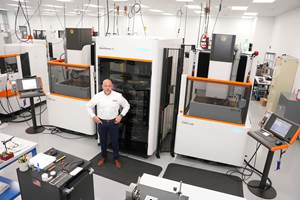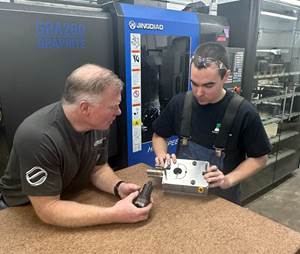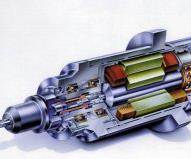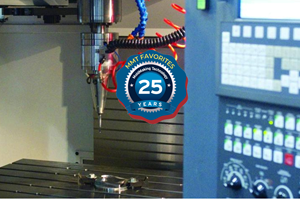Eimo Americas: Combining Forces Multiplies Profits
A commitment to total automation and education earns this one-stop shop an A+ - and an Honorable Mention in MoldMaking Technology magazine's Leadtime Leader competition.
Eimo Americas began as Triple S Plastics in 1969 in Kalamazoo, MI, with only a few molding machines and a handful of employees. Today, the Tooling and Technology Centre plant is 90 employees strong in a 30,000-square-foot facility - specializing in highly complex plastic injection molds for the telecommunications, medical, automotive, consumer products and electronics industries.
According to shop supervisor Jim Williams, this one-stop shop with annual sales of more than $10 million has a seven-week leadtime and offers the following services in one location: product and tool design, tool building, sampling, process development and quality assurance.
"By bringing everything under one roof, we've been much more efficient at serving our customers quicker," he emphasizes. "I have to believe that has had a huge impact on servicing the customers while growing our business and profits."
Company Evolution
Clearly Eimo Americas has come a long way in a little more than 30 years. After occupying its original location (as Triple S Plastics) for three years, the company moved to Vicksburg, MI in 1972. Outgrowing that location, in 1974 they moved to the Portage location and built a 10,000-square-foot facility.
Then Triple S founded Satellite Mold in 1978, which concentrated on prototype tooling. In 1983, the company acquired A-Tech Molds, which focused on production tooling. This same year also saw the opening of a Tucson, AZ molding facility. Unfortunately, in 1990 a devastating fire destroyed the manufacturing area in the Portage Road facility. But Triple S was able to persevere - through the dedication and hard work of its employees - and a year later reopened the Portage Road facility with modernized equipment. Four years later, the company opened yet another plant in Battle Creek, MI. In 1995 it opened a Georgetown, TX molding facility.
The year 1997 saw the combination of Satellite Mold and A-Tech Molds into the Tooling Technology Centre - located next door to the main Triple S plant on Portage Road. After acquiring Dynacept Corp. (Bedford Hills, NY) in 1998 - a rapid prototyping and model making house - Triple S opened a Fort Worth, TX molding facility.
Continuing its acquisitions, Triple S purchased Burco Tool Shop in Denton, TX, and then opened a facility in Manaus, Brazil in 2000. That same year, Eimo Oyj of Finland purchased Triple S - and all of the facilities listed are now known as Eimo Americas. "Now that we are a part of Eimo - with its European and Asian divisions - we are now truly a global presence," Williams emphasizes.
Automation, Automation, Automation
"With the increasingly aggressive changing global markets, we must maintain our focus on the highest quality while continuing to shorten deliveries with the use of new technology and state-of-the-art equipment," Rhonda Kitchen, human resources manager, notes. "We are constantly striving to improve our processes, communication, consistency and quality standards, and also are continuing to reduce our leadtimes. While Eimo has already implemented lean manufacturing, to further reduce leadtimes we are turning to machinery automation."
Machining
To that end, since 1998 Eimo has purchased one Roku Roku and two Roeders high-speed machining centers. "The Roku Roku machine cuts graphite to make electrodes that are used in our EDM equipment and gives us the capability of multiple work station setups," Kitchen explains. "We also can set up large quantities of electrodes that can run unattended. In addition to cutting graphite, the Roeders machines also can cut hardened steel. This feature actually eliminated an entire step out of our moldmaking process. Previously, a moldmaker would have to rough out a cavity block, send the piece out for heat treating and then continue with the machining process. With the Roeders, a blank block can be sent out for heat treating; it can then be machined in one setup.
"The increased capabilities of these CNC machining centers are allowing us to continue to stay competitive," she continues. "Every part that we manufacture these days has contoured lines. These contours used to be burned in the EDMs. We now have the option of cutting the steel. With the automatic tool changers, we can set up anywhere from 12 to 36 tools. With the automation of programmability, we now have one to two operators maintaining five machines, 24 hours per day."
Eimo then purchased Partners CNC milling machines in 2000 to replace conventional mills. "Many functions - which used to be scheduled through the CNC department - now can be done by the moldmaker using these new machines," Kitchen says. "Drilling and reaming ejector pin holes, water lines, simple pocket milling and non-contoured details are functions now performed regularly on the Partners. Accuracy and speed are other improvements brought to the milling process."
EDM
The EDM department also has become more automated with the arrival of a Charmilles 55P electrical discharge machine last May. "This new machine provides automation with a pallet system, which will allow four jobs to run automatically," Kitchen comments. "Not only does it have the capability of automatic setups with electrodes, it allows for automatic setups with cavity blocks. Pallets will reduce setup time by approximately 25 percent. The new machine has a 90-station electrode changer and a four-pallet system, which is more than triple our newest machine. One setup on the cavity blocks will allow CNC, EDM and CMM to manufacture a cavity block on one setup, as opposed to the previously required three setups.
"The pallet will move from machining center to machining center and eliminates the need for multiple setups," Kitchen adds. "Integrated machining modes open many new possibilities for present and future applications. These modes - which allow the machining of complex shapes with simpler electrodes - include rotary, conical, angular, vectorial, planetary, spherical, helical and contour machining. Also, concurrent programming allows an operator to prepare for the next job, while completing the current job. This feature will decrease non-machining time. The end results are steady machining, faster machining, less electrode wear and longer unattended operations."
CAD/CAM
Additionally, automation also has been implemented in the company's CAD/CAM department. In response to its lean manufacturing processes, Eimo has started using both templates and macros to reduce keystrokes, thus speeding up the entire design process.
"While continuing to maintain our quality standards, we have been able to increase the number of jobs through our shop," Kitchen says. "Our efficiencies have enabled us to invest more in capital, rather than increasing our head count. Although the market has driven down the price of our products, we have been able to drive down our costs and reduce our leadtimes, allowing us to stay globally competitive."
Focus on Education
Continually challenging and educating its employees is another area in which Eimo excels. It must be doing something right - the company has a less than one percent turnover rate and did not have to lay off one employee during the recent economic slump. The company takes typical training one step further. Besides offering its employees the opportunity to take both moldmaking courses as well as subjects like computer training and seminars on topics from time and stress management to learning to accept change, Eimo reimburses its apprentices for good grades.
"What makes our apprenticeship program different from other shops is our desire to guide them to be top-notch moldmakers," Kitchen explains. "We reimburse our apprentices more than 100 percent if they earn an A in a class - and we also take them to lunch and give them a small gift. Jim does a great job of emphasizing the importance of the classes. We actually reimburse all the way down to a C, but it's much less then. And, if someone gets a C, Jim will be having a chat with them!"
Additionally, Eimo has trained its key employees and managers in lean manufacturing and Kaizen, which Kitchen describes as continuous improvement through small incremental improvements. Kaizen emphasizes making a task simpler and easier to perform while increasing speed and efficiency.
"We've focused on some bottleneck areas in our shop and once we can improve these areas, then the bottleneck seems to move to another area of the shop," production control and staff photographer Craig Riddle notes. "Right now it's the shop floor and we are starting to get some lean training regarding how our equipment is laid out on the shop floor to see if we can improve efficiencies. Whenever we have problems pertaining to molds or the process of mold building, we document that problem and how we solved it."
Part of this documentation is shared with everyone in the company. "We post such information on a bulletin board in a certain area in our shop and we require all of our employees to stay abreast of all of that information," Riddle explains. "It stays on the board for three months and then we put it in a book that stays out there. It also is loaded into our Lotus Notes so everyone in the company can look into it. This has saved us hours, days and possibly weeks out on the shop floor. With so many employees, it's a great way for everyone to learn from each other. And, once in awhile, we will have a little fun and give out candy bars to people that know most of the items on the board. They never know when we are going to quiz them so they have to keep on top of this information. When we do quiz them and they don't know what's on that board, we document it and it goes into their personnel files, and when we evaluate them for their annual pay increases it comes into play. So, it's not only fun, but we do take it seriously."
On the Horizon
According to Williams, over the next year Eimo will be implementing major changes on the shop floor to streamline its processes. "We'd like all of our moldmakers to do the same things - squaring up the blocks the same way, grinding the blocks the same way - so we can try to cut some non-value-added steps that we are doing right now out of the tool build," he notes. "Wherever we can take a minute off of a job, we are after it!"
Automation also will continue to play a major role into streamlining operations. "Going into 2003, many of our plants are becoming fully automated and many have gone to electric presses, which are much more efficient," Williams notes. "We already have begun to replace hydraulic machines in our sample area with electric presses. We are looking into adding automation to all of the sample presses, which will let us take the sample test and function of all new molds in our facility one step further before we release them to any of our manufacturing plants."
Williams adds that a recently purchased laser microwelder has already proven itself to be a real timesaver and over the next year he predicts even better timesavings as Eimo fine-tunes this craft. "From our understanding, the manufacturer of the laser says there are only four welders like this in the United States," he notes. "We've been helping them further develop this laser and it's really paid off. We used to use a local microwelder and our business to him has dropped by about 60 percent because we can do our own microwelding in-house now with such precision that we can train our employees to microweld."
Finally, Eimo wishes to continue its practice of maintaining its current workforce. "We don't want to reduce our headcount; we want to increase the tools we build through training and lean manufacturing, technology and equipment," Kitchen stresses. "We've been gifted to have such a great workforce - these people take their jobs very seriously and they know they have to push the limit on everything that they are doing to keep our customers happy." In the end, customer satisfaction is what it's all about.
Related Content
Mold Builder Meets Increased Domestic Demand With Automated Cells
Burteck LLC experienced significant demand increases due to reshoring and invested in automated machining cells to step up its production output quickly and avoid losing business.
Read MoreFive-Axis Graphite Mill With Automation Debottlenecks Electrode Machining
Five-axis electrode cutting enabled Preferred Tool to EDM complex internal screw geometry on an insert that otherwise would have had to be outsourced.
Read MoreDevelopments in High-Speed Machining Technology
There have been many exciting developments in high-speed machining relative to machining centers and controls, tooling and CAD/CAM systems.
Read MoreMachine Hammer Peening Automates Mold Polishing
A polishing automation solution eliminates hand work, accelerates milling operations and controls surface geometries.
Read MoreRead Next
How to Use Continuing Education to Remain Competitive in Moldmaking
Continued training helps moldmakers make tooling decisions and properly use the latest cutting tool to efficiently machine high-quality molds.
Read MoreReasons to Use Fiber Lasers for Mold Cleaning
Fiber lasers offer a simplicity, speed, control and portability, minimizing mold cleaning risks.
Read More


















